Do you own a Dachshund? These lively little friends require specific care, especially when it comes to their food. It is essential to have a well-planned feeding schedule for Dachshunds to ensure their well-being and long life. This comprehensive manual, including a detailed Dachshund Feeding Chart, will assist you in understanding the distinct dietary requirements of your Dachshund at different stages of life. Whether you have a spirited puppy or an experienced older dog, we have all the information you need.
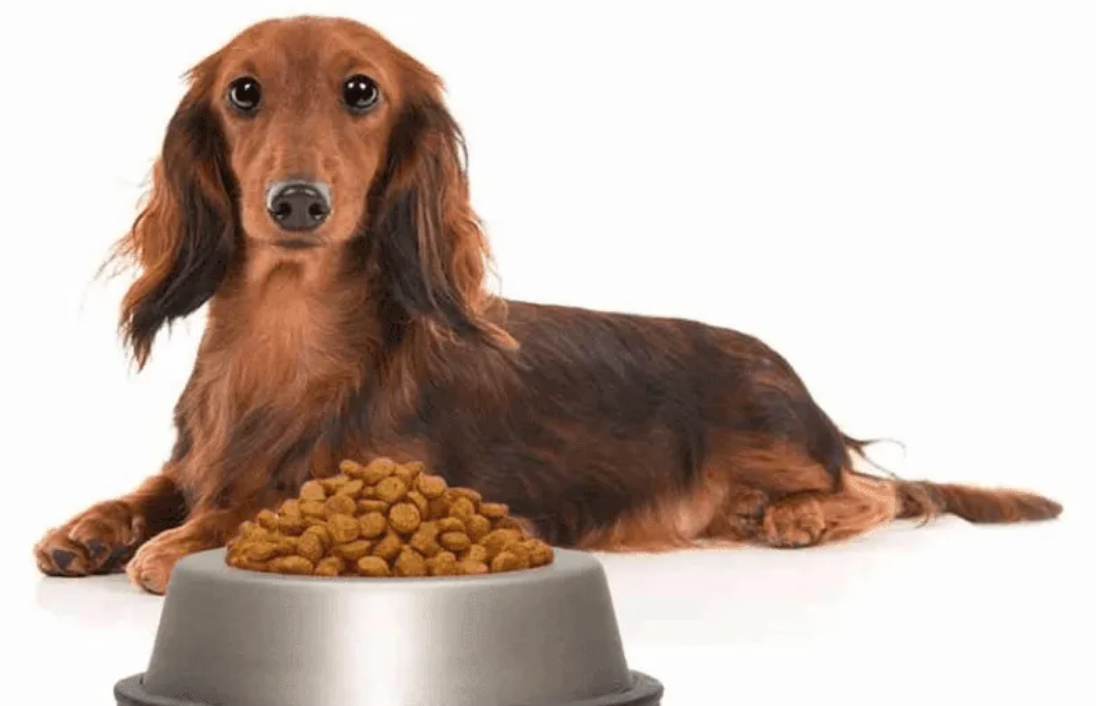
Mastering the Dachshund Feeding Chart: Nutrition Essentials
What Are the Nutritional Needs of Dachshunds?
Dachshunds have unique nutritional requirements because of their small stature and active nature. They need a well-rounded diet that includes proteins, fats, carbohydrates, vitamins, and minerals. Proteins help in building muscles, fats provide energy and aid in absorbing nutrients, carbohydrates are crucial for maintaining overall energy levels, while vitamins and minerals play a role in different bodily functions.
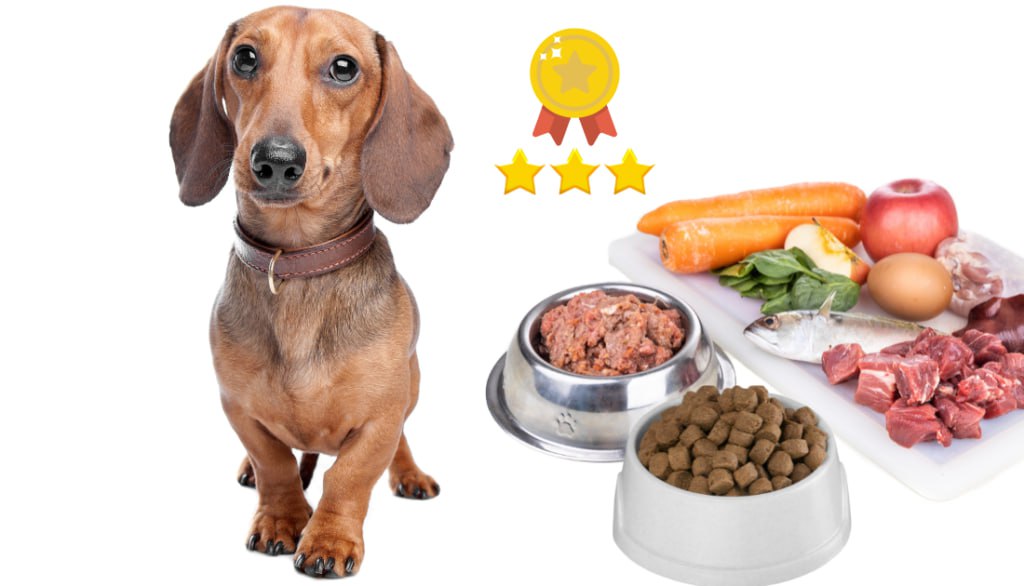
Why Is a Dachshund Feeding Chart Important for Your Dog’s Health?
Having a feeding schedule for your dachshund is very important to keep your dog healthy by controlling how much they eat and making sure they get the necessary nutrients at the correct times. If you don’t control their portions properly, your dachshund could experience problems like being overweight, not getting enough nutrition, and having digestive issues. A carefully planned feeding chart allows you to manage your dachshund’s weight and health effectively, which is vital for any caring pet owner.
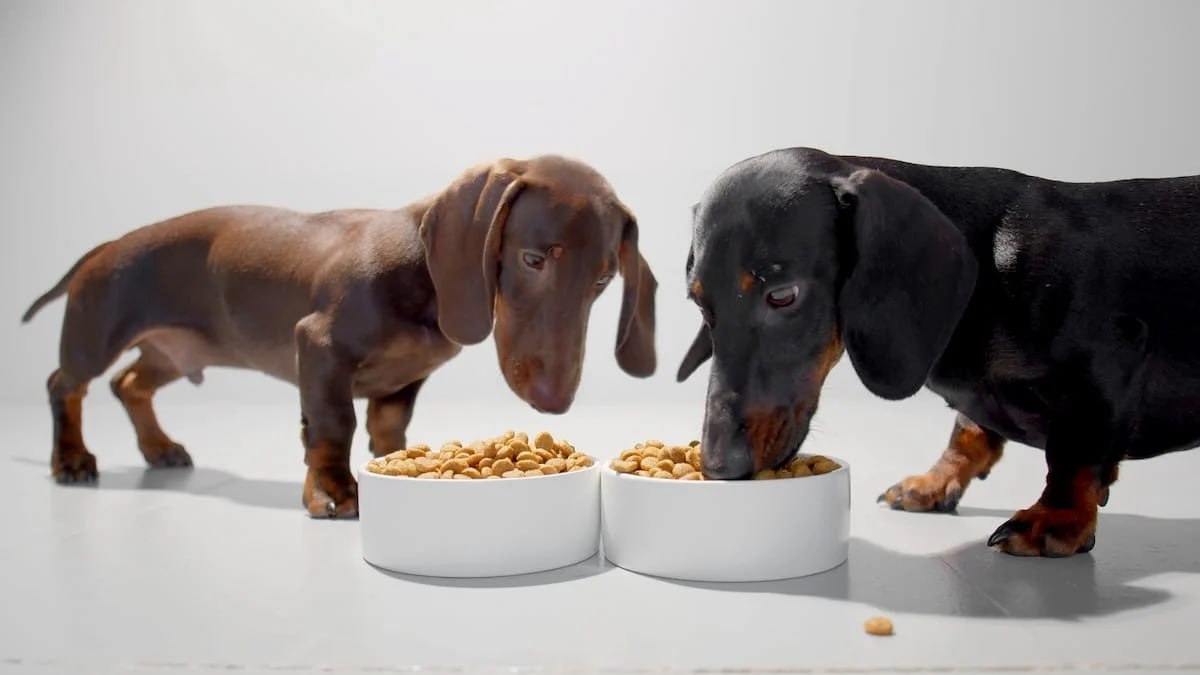
Age-Specific Feeding Guidelines
Here’s a simplified and easy-to-understand Dachshund feeding chart based on age groups:
| Age | Amount of Food | Frequency |
| Puppies | About 55 calories per pound of body weight per day | 3-4 meals per day |
| Adults | 30-35 calories per pound of body weight per day | 2 meals per day |
| Seniors | Adjust based on activity level and health needs | 1-2 meals per day |
Feeding Dachshund Puppies (0-12 months)
How much food should a Dachshund puppy eat?
Dachshund puppies require more calories than adults because they are growing quickly. Typically, based on a feeding chart for Dachshunds, a puppy should have around 55 calories per pound of body weight each day. This helps ensure they get the right nutrients for proper development.

How often should you feed a Dachshund puppy?
To support their energy levels and growth, puppies should be fed 3-4 times daily. This regular feeding routine is important in preventing hypoglycemia, which is a common issue in small breeds like Dachshunds. If you’re wondering about feeding a mini Dachshund, the same advice applies: make sure they get enough calories spread out over several meals to meet their growth and energy requirements.
Feeding Adult Dachshunds (1-7 years)
How much food should an adult Dachshund consume daily?
Adult Dachshunds require fewer calories compared to puppies. Generally, they need around 30-35 calories per pound of body weight each day. Adjust the amount depending on their activity level and health status.
What is the best feeding schedule for adult Dachshunds?
It is recommended to feed adult Dachshunds twice daily. This will help regulate their energy levels and avoid overeating. It is important to stick to a consistent feeding schedule to maintain their digestive health.
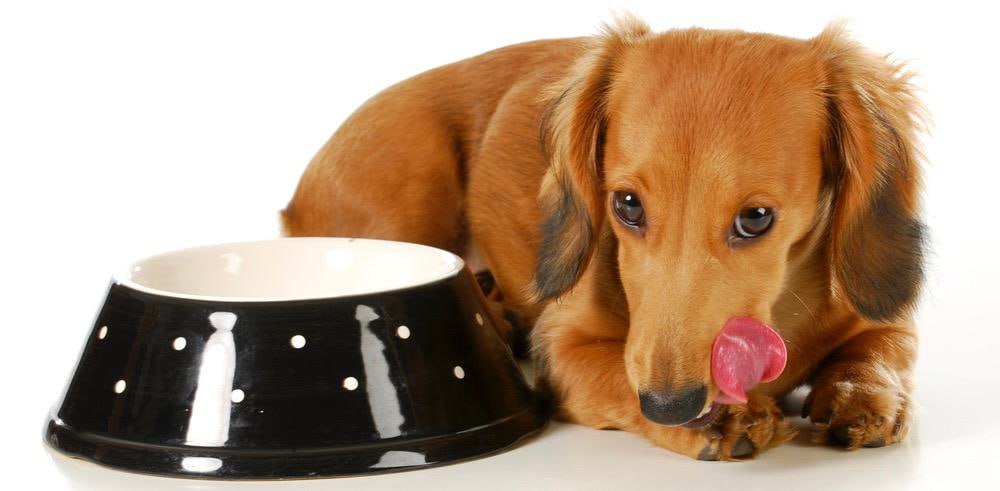
Feeding Senior Dachshunds (7+ years)
What Changes in Dietary Requirements Do Senior Dachshunds Experience?
As Dachshunds age, they need less calories but more fiber to support their digestion. Their metabolism decreases, so it’s important to modify their diet to avoid weight gain and health problems.
How Should You Modify Their Feeding Routine and Amounts?
Providing smaller, frequent meals can assist older Dachshunds in digesting food effectively. Transitioning to senior-formulated dog food designed for their evolving nutritional requirements is also beneficial.
Weight-Specific Feeding Recommendations
Feeding Based on Weight
Utilize this detailed Dachshund feeding guide to determine the right amount of food based on your Dachshund’s weight and activity level:
| Dachshund’s Weight | Amount of Food for Sedentary Activity Level | Amount of Food for Average Activity Level | Amount of Food for Robust Activity Level |
| 4 pounds (1.8 kg) | 1/2 cup | 5/8 cup | 5/8 cup |
| 7.5 pounds (3.4 kg) | 3/4 cup | 1 cup | 1.25 cups |
| 11 pounds (5 kg) | 1 cup | 1.25 cup | 1 3/8 cups |
| 14.5 pounds (6.5 kg) | 1.25 cups | 1.5 cups | 1.5–1.75 cups |
| 18 pounds (8 kg) | 1.5 cups | 1.75 cups | 1 7/8 cups |
| 20 pounds (9 kg) | 1.5–1.75 cups | 1.75–2 cups | 1 7/8–2.25 cups |
| 22 pounds (10 kg) | 1.75 cups | 2 cups | 2.25 cups |
| Over 22 pounds (>10 kg)
(This part is an approximation; consult your vet for more precise feeding advice.) |
Add about 1/8 cup per every 3–5 pounds. | Add about 1/4 cup per each additional 3–5 pounds. | Add about 1/4 cup per each additional 3–5 pounds. |
Determine your Dachshund’s daily calorie needs based on their weight. For example, a 15-pound Dachshund would typically require around 450-525 calories per day. Adjust portion sizes according to the food’s calorie content to maintain their health and ideal weight. Using a Dachshund Feeding Chart offers a structured method to ensure your pet gets the right nutrition for their size and energy requirements.
Adjusting Portions for Overweight and Underweight Dachshunds
What can you do to assist your Dachshund in losing or gaining weight in a healthy manner? To help overweight Dachshunds, decrease their calorie consumption by 10-20% and boost their physical activity. If your Dachshund is underweight, increase their calorie intake and seek advice from a veterinarian to address any potential health problems.
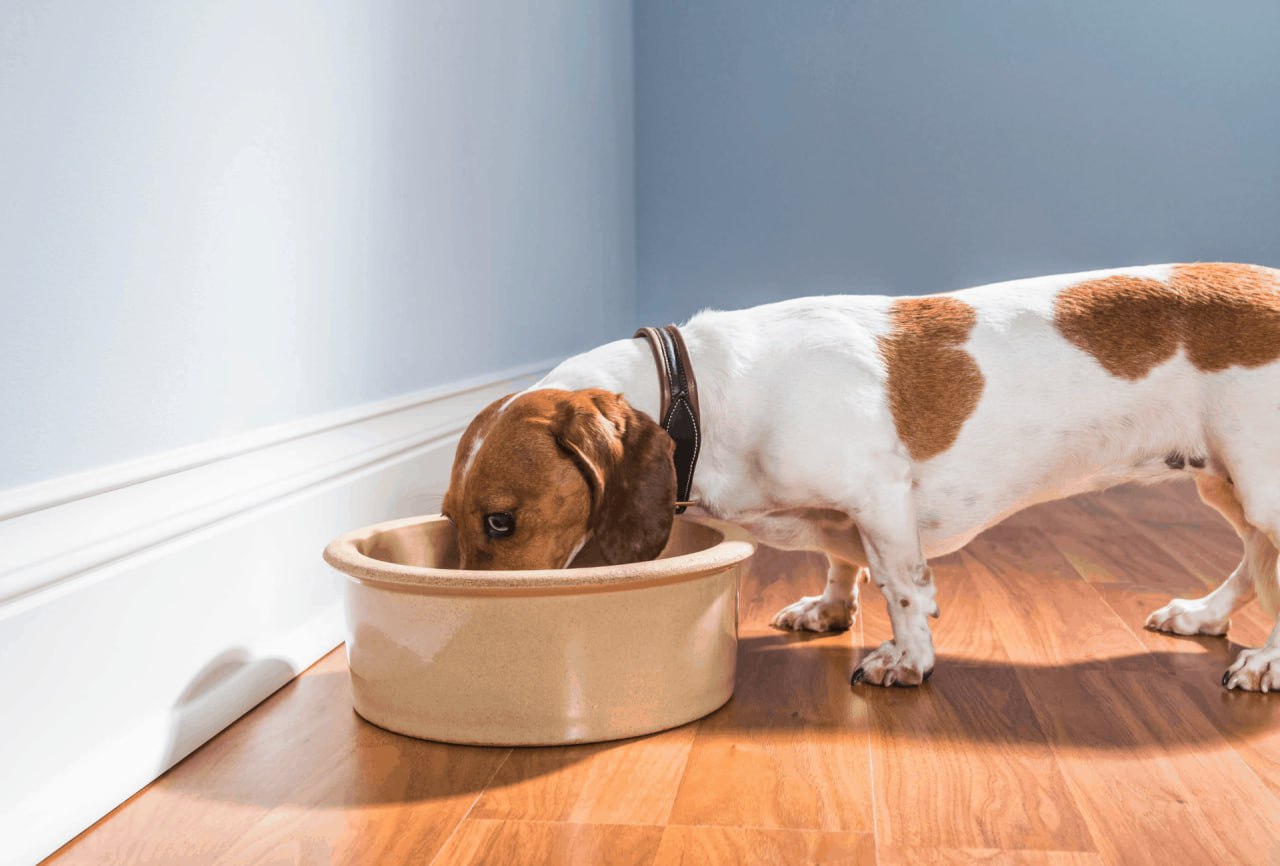
Types of Food for Dachshunds
Selecting the appropriate food is essential for the health and happiness of your Dachshund. If you’re unsure about what foods are suitable for Dachshunds, here are various diet options to think about:
Dry Kibble vs. Wet Food
Dry kibble is easy to use and can assist in keeping teeth clean by preventing plaque accumulation. Nevertheless, it might not be as tasty as wet food. Wet food is more hydrating and attractive to certain dogs but can lead to dental problems if proper oral care is neglected.

Homemade Diets
Creating your own Dachshund’s meals enables you to tailor their food to suit their individual requirements and tastes. For instance, a homemade dish might include cooked chicken, brown rice, and vegetables. It’s important to seek advice from your vet to make sure the diet is well-balanced and fulfills your dog’s needs.

Recommended Brands
There are various well-known brands that provide specially tailored diets for Dachshunds:
- Royal Canin: Renowned for its breed-specific formulas catering to the distinctive nutritional requirements of Dachshunds.
- Blue Buffalo: Offers natural and holistic recipes emphasizing premium ingredients.
- Hills Science Diet: Offers scientifically crafted diets to promote overall health and energy in Dachshunds.
Special Dietary Needs
Health Conditions
Dachshunds, like many other breeds, may have specific health issues that require special dietary considerations. If your Dachshund has allergies, switching to hypoallergenic dog food can help reduce symptoms. Hypoallergenic formulas are made to minimize allergens and usually do not contain common triggers such as wheat, soy, and certain proteins. For digestive problems, foods that are high in fiber and low in fat can enhance gastrointestinal health and support regular bowel movements. It is important to always seek advice from your veterinarian for personalized recommendations tailored to your Dachshund’s individual health requirements. Utilizing a dachshund feeding chart can assist you in monitoring and managing their dietary intake effectively.
Weight Management Formulas
It is important to keep your Dachshund at a healthy weight for their general health. Choose dog food that is specifically designed for weight management or labeled as light. These types of food have fewer calories and more fiber, which can help your Dachshund feel satisfied while eating less. This is especially helpful for Dachshunds that tend to gain weight easily. By using weight management formulas, you can help your pet reach and stay at a healthy weight, lowering the chances of health problems related to obesity.

Treats and Snacks
Appropriate Treats
Selecting low-calorie, natural snacks is crucial for caring for your Dachshund. Opt for healthy options like baby carrots, apple slices, and specially marked nutritious dog treats. Steer clear of sugary or artificial treats to prevent weight gain and potential health problems.
Calorie Considerations
As per a dachshund feeding guide, treats should make up only 10% of your Dachshund’s daily calorie intake. It is important to be cautious about the quantity and size of treats given to avoid overfeeding and to keep your dog at a healthy weight. For instance, if your Dachshund needs 500 calories a day, limit treats to 50 calories daily.
Transitioning Between Foods
Gradual Transition Process
It is advised to slowly introduce a new food into your Dachshund’s diet over a period of 7-10 days. Begin by combining 25% of the new food with 75% of the old food. Over time, gradually increase the amount of the new food while reducing the old food every couple of days. This gradual change helps your dog’s digestive system adapt smoothly without causing any discomfort.
Mixing and Portion Adjustments
While transitioning, keep a close eye on how your Dachshund responds to the new food. Watch for any digestive problems like diarrhea or vomiting. If these issues arise, you may need to tweak portion sizes or slow down the transition process. If problems persist, seek advice from your vet to ensure your Dachshund stays healthy during the dietary change.
Common Feeding Mistakes to Avoid
Overfeeding and Underfeeding
One of the most common errors made by Dachshund owners is either giving their pets too much food or not enough. Feeding them too much can cause them to gain weight, become inactive, and increase their chances of health problems related to obesity. Signs that you may be overfeeding your Dachshund include noticeable weight gain and a lack of energy. Conversely, if you are underfeeding them, they may lose weight, have low energy levels, and show visible ribs. It is important to regularly monitor your Dachshund’s weight and adjust their meals as needed to keep them within the recommended weight range outlined in the Dachshund feeding guide.
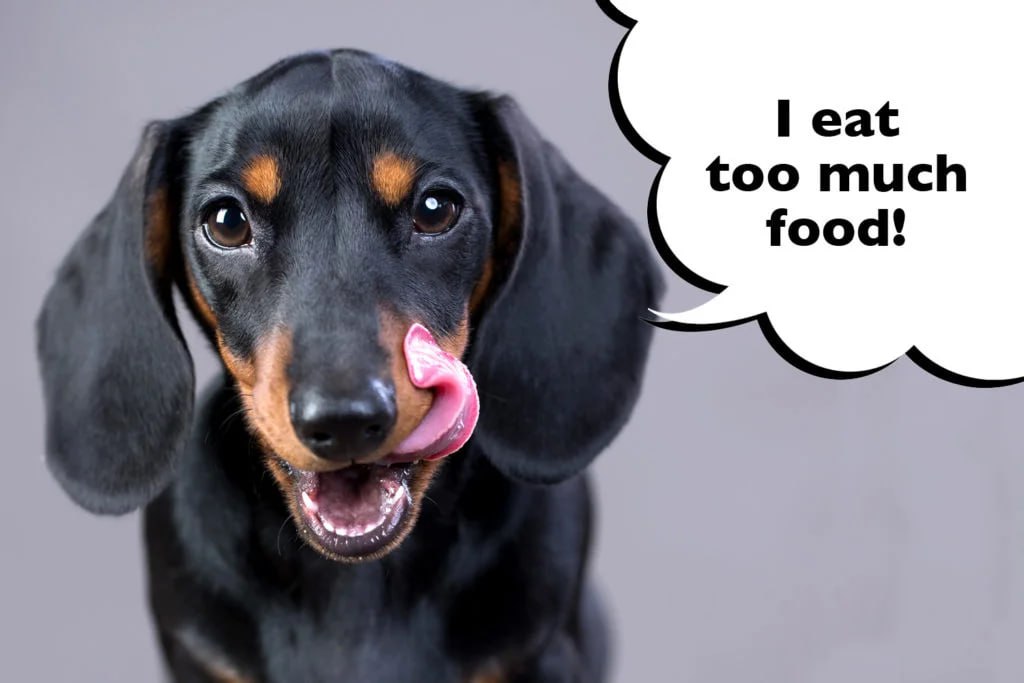
Foods to Avoid
Some foods can be poisonous to Dachshunds and should never be given to them. Chocolate, grapes, onions, garlic, and caffeine are especially dangerous and can cause serious health issues if consumed. Make sure to keep these substances away from your Dachshund and refrain from feeding them as treats.
Monitoring and Adjusting Diet
Regular Weight and Health Checkups
Regularly weighing your Dachshund and scheduling veterinary checkups every 6-12 months are essential for maintaining their health. These routine health evaluations can detect any possible problems early on, enabling prompt interventions and dietary changes.
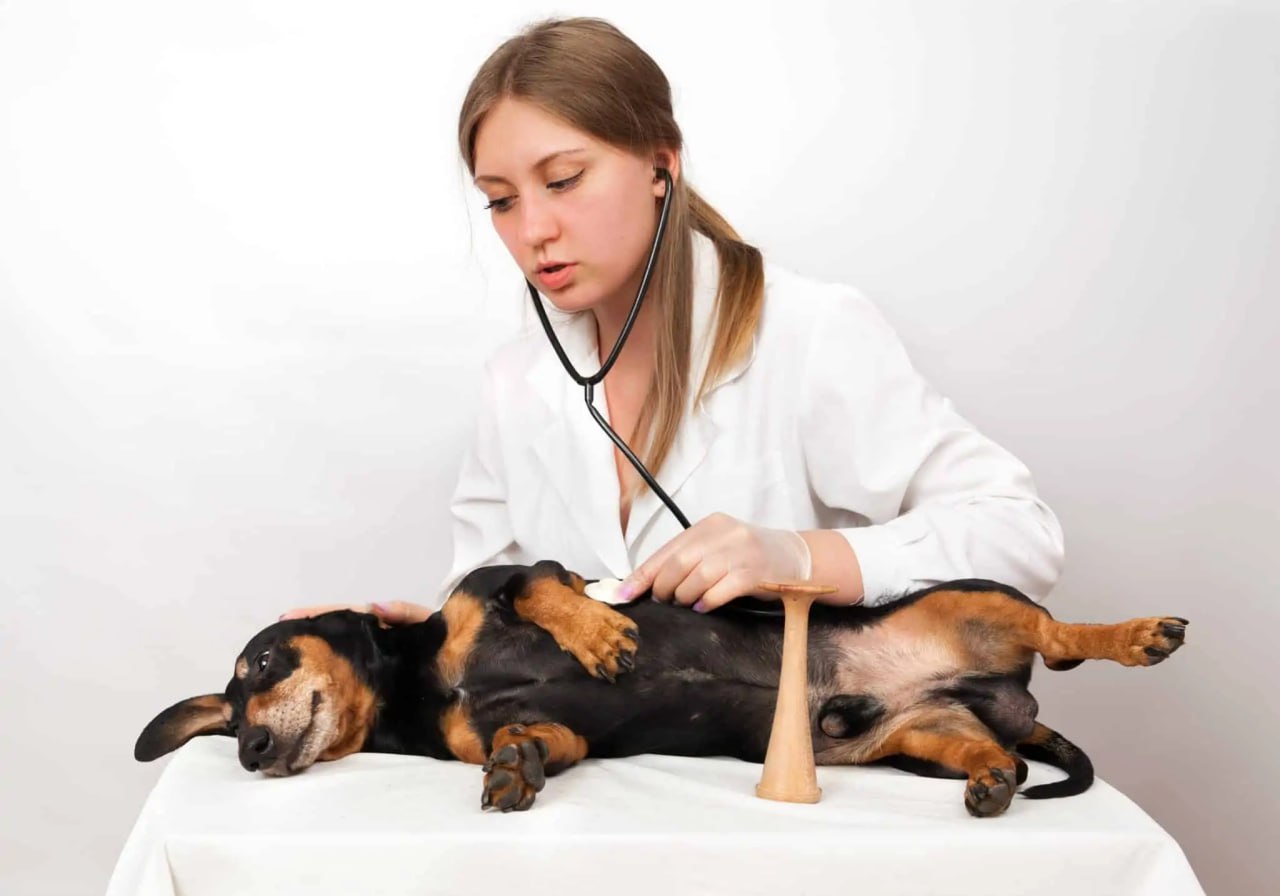
Adjusting Diet Based on Activity Level and Health
The dietary requirements of a Dachshund can vary depending on their level of activity, age, and overall health. For example, a Dachshund that is more active may need more calories, whereas an older or less active dog may require fewer calories. While you can refer to a feeding chart for general guidance, it is important to consult with your veterinarian for personalized dietary advice. Your vet can offer recommendations tailored to your Dachshund’s individual needs, ensuring they get the proper nutrients to stay in good health and shape.
FAQs
How much food should a dachshund eat a day?
A Dachshund’s daily calorie intake should be around 30-35 calories per pound of body weight. It may need to be adjusted depending on its activity level and age.
What Is the Best Food for a Dachshund with Allergies?
It is recommended to choose hypoallergenic dog food or options with limited ingredients. It is advisable to seek personalized recommendations from your veterinarian.
Can Dachshunds Eat Human Food?
Certain human foods are acceptable in limited quantities, such as cooked meat and vegetables. It is important to steer clear of harmful foods like chocolate, grapes, and onions.
What is the ideal diet plan for Dachshunds based on their feeding chart?
The ideal dog food for Dachshunds should contain a good amount of protein, a moderate level of fat, and omega-3 fatty acids to promote healthy joints and support their energetic lifestyle. Choosing the best dog food for Dachshunds is crucial, as it allows you to tailor the serving sizes according to their weight and activity level. Adhering to a specific feeding schedule helps avoid obesity and associated health problems, ensuring your Dachshund remains healthy and active.
Conclusion
Maintaining your Dachshund’s health and well-being requires a balanced diet and a proper feeding schedule. It’s crucial to adjust their food intake based on factors like age, weight, and specific health issues to ensure they get the necessary nutrients. Puppies, adult dogs, and seniors have different nutritional needs, so following a Dachshund Feeding Chart can assist in meeting those requirements. For personalized advice, consult your vet for tailored guidance. Remember, a well-fed Dachshund is a content and healthy pet.
Do you have any feeding tips or stories about your Dachshund? Share them with us! Feel free to leave your comments and inquiries below to engage with other Dachshund owners. Enjoy feeding your furry friend!

